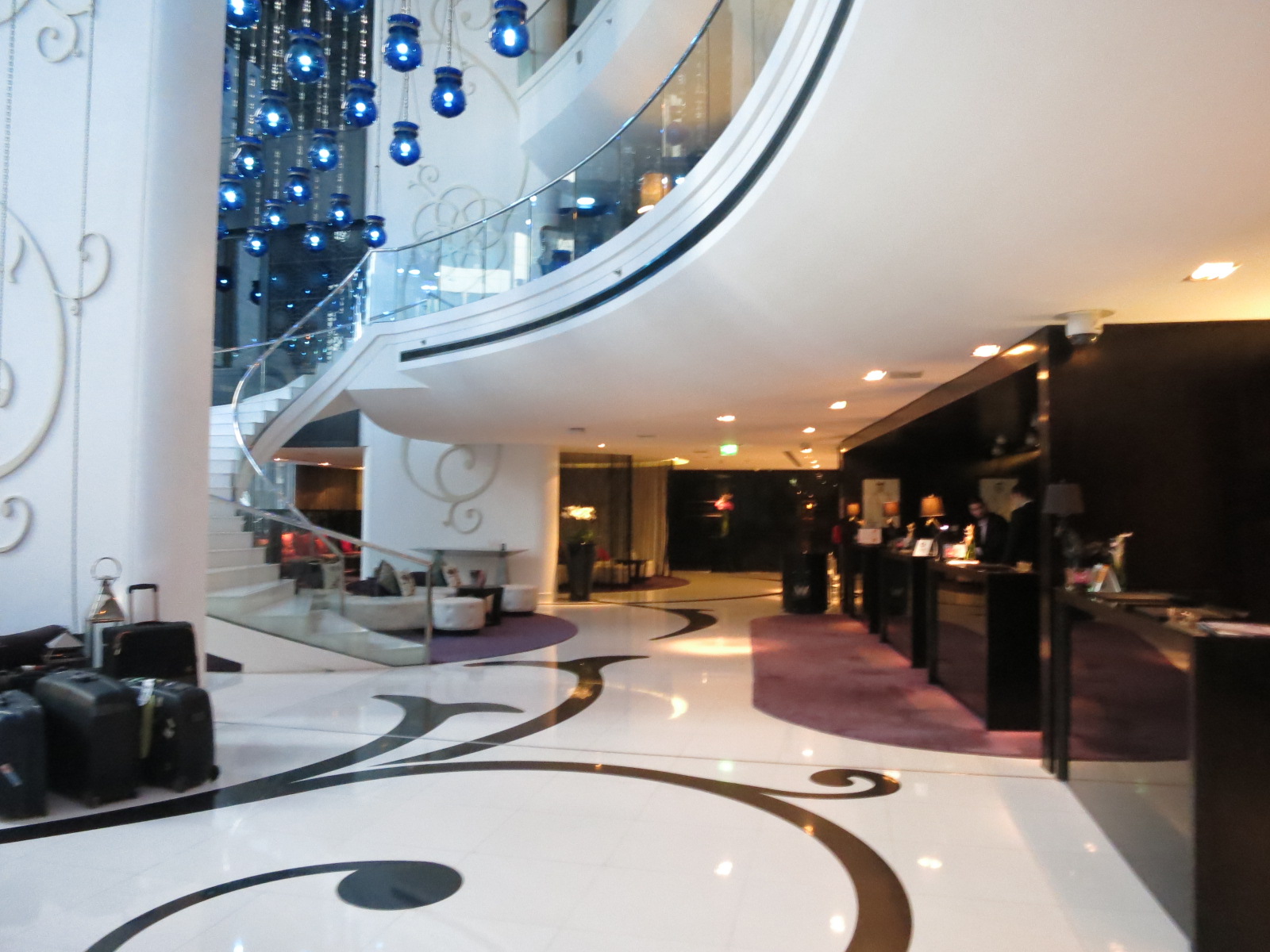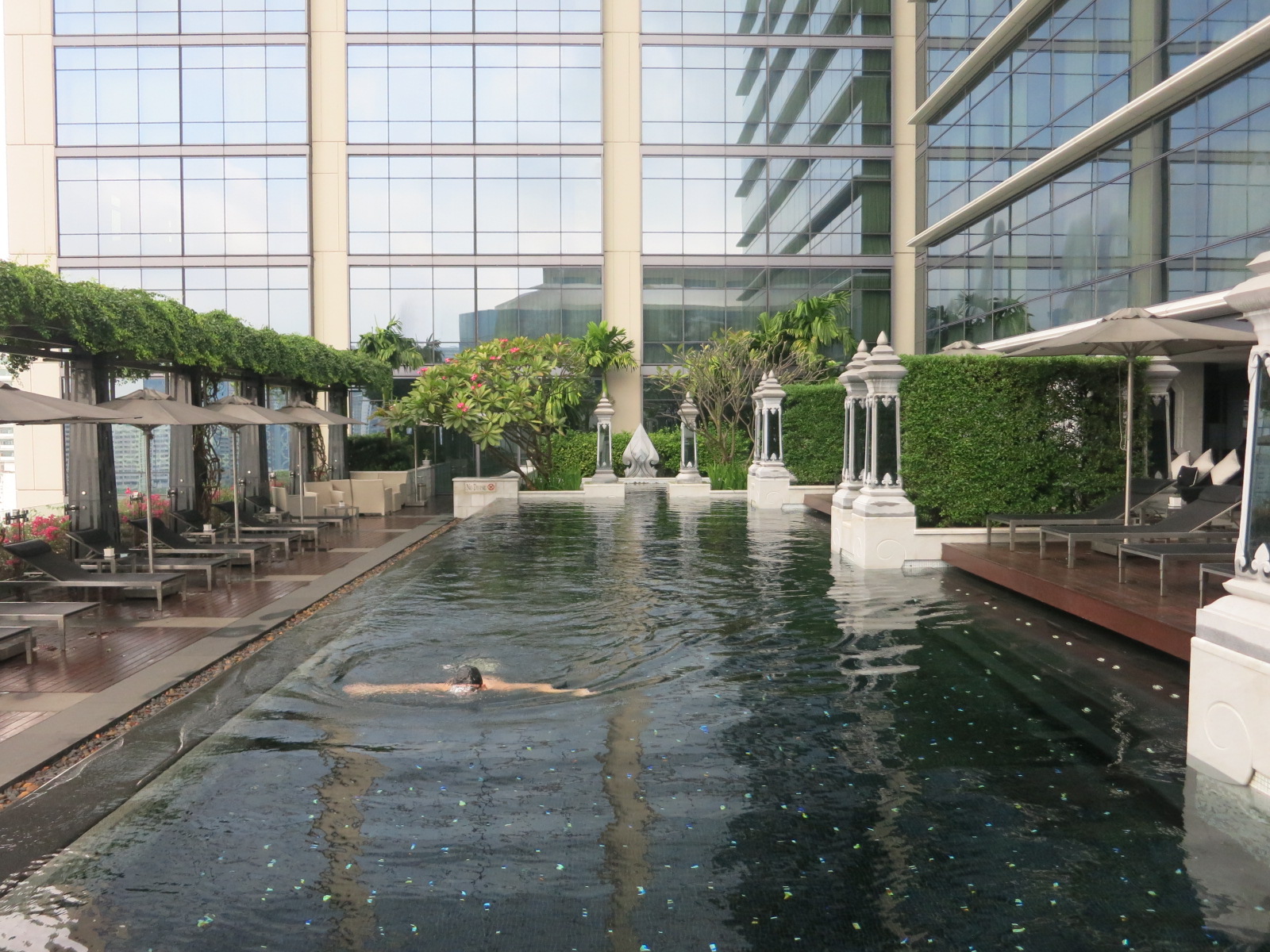Starwood was being shopped aggressively for over 6 months, and Marriott wound up the high bidder in the eyes of the Starwood board. There was likely interest from foreign purchasers. Definite interest from Hyatt. Possible interest from IHG and Wyndham.
On Friday Starwood’s customers and shareholders were excited by a Chinese group led by insurer Anbang making a substantially higher offer for the hotel chain than the pending Marriott Marriott acquisition deal.
On Monday Marriott increased their offer substantially to take the lead in the acquisition of Starwood.

W Doha
All of this has been great for Starwood stock. Shareholders one way or another will get substantially more for their shares than before. With the Starwood board declaring that they would move forward with Marriott’s new offer of 0.8 Marriott shares and $21 in cash for each Starwood share, and a shareholder vote scheduled for April 8, it appears that Marriott is most likely the acquirer.
This is far from a done deal however.
- Anbang already offered $78 in cash.
- Marriott’s shares rose when Anbang looked like it would outbid for Starwood. When Marriott increased its offer, shares fell. (And in part it was that higher value of shares that made the Marriott offer look sufficiently attractive to accept.) Marriott’s shares fell further after the Brussels attack yesterday.

- I wouldn’t overread into one day share price moves, especially after an event like Brussels. But the value of the Marriott deal at yesterday’s close was down to $77.74 a share in cash and stock, less than Anbang’s all-cash offer. And it does underscore the uncertainty in the value of Marriott’s offer — heavily dependent on future price moves up until the transaction actually closes.
- As Marriott’s CEO told employees, Anbang can still make a new offer.
Indeed, some analysts predict a new higher offer from the consortium led by the Chinese insurer.
Some analysts expect Anbang to counter Marriott’s recent offer with a significantly higher all-cash bid. In a note to investors, David Loeb, managing director and senior real estate research analyst for Milwaukee-based Baird Equity Research, estimated Anbang would give as much $85 per share for Starwood, about $5 more than what Marriott has presented to Starwood (approximately $79.53 per share).
“I think Anbang is pretty likely to come back and make another offer,” Loeb told Skift. “I think the door is open for that and it seems like the likely outcome at this point.
The likelihood of an increased bid is echoed by Starwood alum and Leading Hotels of the World CEO Ted Teng, an analyst for RBC Capital Markets, and a managing director and equity research analyst for Barclays Capital.

St. Regis Bangkok
It wouldn’t take much more cash to be the clearly superior offer. It’s unclear that the Marriott’s current offer is actually better than the last Anbang offer.
If Anbang does prevail, Marriott will get the increased breakup fee of $450 million plus another $18 million in costs. The breakup in Marriott’s revised offer is actually up to $468 million. Instead of spending more than an extra billion dollars over their previous offer, Marriott would pocket almost half a billion dollars and not have the herculean task of making the acquisition work and deliver results.
There’s still plenty of uncertainty in the outcome.
- Will Anbang up it offer? (Chinese companies have historically been unwilling to engage in such competitive bidding in the US, but may also have a strong mandate to succeed)
- Will regulators approve an Anbang deal? (Probably, but Marriott has already cleared regulatory hurdles)
- Are there Chinese barriers to closing? (China’s insurance regulator could reject the deal for investing too much of the company’s assets abroad, though it’s not clear they would actually be over the proscribed threshold and the company’s Chairman is married to the granddaughter of Deng Xiaoping so may have more political juice than the regulator in any case.)
We’ll have 16 days before the next move needs to be made, though presumably Anbang won’t wait quite that long if they’re going to act.
Regardless the apocryphal ‘Chinese curse’ is certainly true: we’re living in interesting times.


I’d expect Anbang to come out on top because there’s value in the currency hedge of holding USD assets when CNY is expected to depreciate as currency controls loosen over time. This benefit doesn’t apply to Marriott, so Starwood naturally shouldn’t be as valuable to them even if they’d like to believe that it is. We’ll see…
Marriott always gets a non refundablele cancelation fee that’s what they historically have done best
While I’m not thrilled about a Marriot merger, I’m very concerned about Anbang taking things over.
An relatively new insurance company who makes money primarily by selling Chinese people high risk/high yield bonds with no hotelier experience (I don’t count their Waldorf acquisition as they pay Hilton to manage it – but to mention it was an overpriced buy & a disappointing hotel in general in NYC given its pedigree).
I see Starwood a big loser when the inevitable happens & Anbang falters down the road & costs need to be cut.
No surprise Marriott’s shares rose after the Anbang announcement – it was set to receive $400m in a breakup fee! After upping its offer, it loses that benefit though…
No expert but couldn’t Marriott shareholders still reject the deal? Seems like the market doesn’t think it’s a good deal for Marriott since their stock went down as you mentioned.
I hope the Marriott shareholder can see that they won’t get the combined revenue of Marriott and Starwood. Their will be a group of Starwood elites jumping ship, to Hyatt or Hilton. While these elites may represent a small percentage of Starwood’s customer base, they represent a large percentage of revenue.
Another “analysis” based on nothing but wishful thinking. Stock prices go up and down all the time and people in the big leagues know this. So, stock market gyrations are not going to determine whether or not Marriott gets Starwood. The only thing that would do that at this point is a higher bid that Marriott would be unwilling — not necessarily unable — to match, feeling that they’d reached the point of diminishing returns in their attempt to acquire Starwood.
@DCS it seems almost like you didn’t even read the post, or at least didn’t understand it. if you had/did you wouldn’t make comments like “Stock prices go up and down” since I wrote precisely “I wouldn’t overread into one day share price moves, especially after an event like Brussels.”
point is though that the value of Marriott’s stock is the largest driver of the value of their offer, and recent moves simply underscore that the offer is not as strong as it may have appeared to some at first blush.
No wishful thinking here, I highlight the potential challenges an Anbang offer faces (such as comments by a Chinese regulator about the percentage of foreign assets an insurer may own).
Marriott is already overpaying for Starwood. While I don’t think they’d overpay even more, I wouldn’t rule it out.
Here’s the thing about all these click-baity posts full of total speculation:
None of us (even the Thought Leader) have any idea what MAR currently thinks of the price of its stock and how much it is willing to up this deal to get it done. It’s trading at ~23x earnings, if that valuation seems rich to Marriott’s board they can keep jacking the amount of this deal up in various ways until they think the dilution changes the equation. Hilton trades at ~15x earnings. There’s actually an excellent quote from Steve Wynn a few years ago about how it is the job of the Board and especially the CEO to monetize shares when they view the market is overvaluing them (if you care you can seek it out on your own, it’s not that hard to find). I imagine MAR can make a compelling case that an even higher price than the current one is still a very good reason to issue equity to fund the deal.
@Scott Castle
I’ve certainly written about companies with inflated valuations using those valuations to leverage themselves into long-run sustainable businesses, see for instance my post just a few days ago on livingsocial contrasting it with priceline.
I’m not sure that shareholders would agree the job of the board is to drive down share price though.
And Hilton as a benchmark for Marriott’s stock price misses very real differences in their businesses, their ability to generate long term revenue from their assets, and where they’re exposed to weaker markets (and not). Incidentally the Starwood deal increases that exposure for Marriott as well.
Its never over until its over except for SPG loyalists who are probably watching the future value of their program decrease with every increase in the purchase price for Starwood.
@Gary — Your explanation of what your post was about indicates that I read it and completely understood what you were driving at. Despite your caveats, it was all stock, stock, stock, which can vary widely. When you first wrote about this following Marriott’s second bid, you were again wondering where Marriott’s stock would be at the end of the day.
Again, the only thing that would cause the pending Marriott-Starwood union at this point is a higher bid by Anbang or some other entity that Marriott would be unwilling — not necessarily unable — to match, feeling that they’d reached the point of diminishing returns in their attempt to acquire Starwood. It won’t be because they are under-performing on Wall Street.
There’s a huge difference between driving the price down and using an overvalued equity as currency to make acquisitions. I am hesitant to post the Wynn quote here because the move up in WYNN was particularly extreme and because they did a huge secondary and not an acquisition, but you will rarely find an executive who speaks so straightforwardly, so….:
“It is the job, and you can take this as a final statement on the subject going forward. It is the job of board of directors and especially of the CEO to take advantage of the market when that market movement is extreme. When a company increases its value by 100% in 60 days, that’s an unnatural movement of value and the market also goes the other way sometimes. These unnatural movements in value, no company gets to be worth twice as much in 60 days as it was before to any intelligent person, so when that happens, we take advantage of it. If everybody is so hungry for shares, we let them have some. If the shares go down, we buy them. And that, that is a statement of policy in this company, period.”
So unless you know what Marriott values their equity at as a acquisition currency it’s impossible to guess how high they’d be willing to go..
@DCS you are reading in conclusions that simply were not in my post
“It won’t be because they are under-performing on Wall Street.”
Poor stock performance means two things.
1. Anbang wouldn’t have to up its offer much to counter.
2. Starwood’s shareholders could get anxious about approving the deal in a couple of weeks.
@ScottCastle it’s not impossible to make perfectly informed educated guesses. Which is why I generally speak in terms of probabilities and not certainties.
@Gary — But you just said it, again! Stocks won’t determine anything. Marriott’s stock were not as high as they are now when Starwood accepted the initial offer. It jumped up only because of the recent events. Long-term prospect is more important than day to day market gyrations. The only way this deal falls through is if someone bids higher. Marriott is not likely to go there even if their stock were worth more. They’ll decide that it was all finally a game and Starwood was not worth that much…